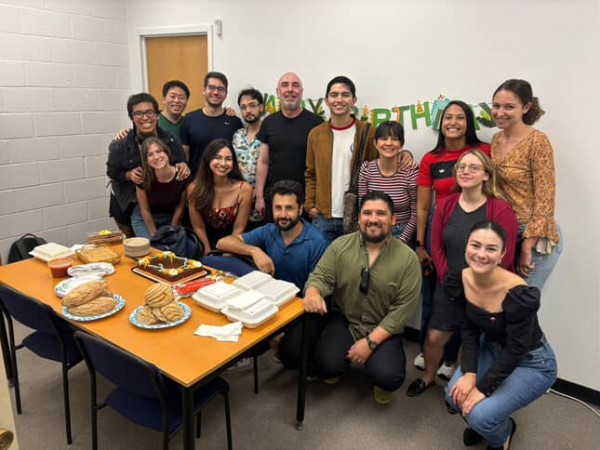Inside the iLCSS: Where Data, Discovery, and Collaboration Drive Social Science Forward
The Interdisciplinary Laboratory for Computational Social Science (iLCSS) at the University of Maryland is where cutting-edge research meets community.
Created to advance core research and training in CSS at the Department of Government and Politics (GVPT), the lab is dedicated to analyzing complex social and political questions through computational methods — and building connections across disciplines while doing it.
“The lab isn’t just about data,” said PhD candidate Flavia Batista. “It’s about people — connecting with others who are curious, driven, and eager to share what they’re learning.”
Led by Dr. Ernesto Calvo (Director), alongside Dr. Johanna Birnir (co-founder), Dr. Fiona Shen-Bayh, Dr. Marcus Johnson, and Dr. Giancarlo Visconti, iLCSS brings together GVPT faculty, PhD candidates, graduate students, and affiliated researchers working on some of today’s most urgent political and social challenges.
From analyzing how misinformation spreads on social media to seeing how polarization shapes the dissemination of public health messages, iLCSS researchers use data to model social phenomena and decode how the world works. The lab’s research spans six core areas:
- Identity
- Large Language Models (LLMs)
- Political Communication
- COVID-19
- All Minorities at Risk (AMAR)
- Gender and Politics
Their work has appeared in top journals in the fields of Political Science and Communication, such as The American Political Science Review (APSR), The Journal of Politics (JOP), Nature’s Scientific Reports, Nature’s Scientific Data, the Journal of Communication, Digital Journalism, and PNAS Nexus, among others.
Most projects explore connections between information, communication, and policy. This ethical and political implications of CSS, at the intersection of information and policy, are well featured in the recent book Detaining Immigrants, Scoring Criminals: How Scoring Algorithms Transformed Anti-Immigrant Sentiments into Policy, co-authored by Dr. Calvo and Robert Koulish. This book shows how human-in-the-loop adjustments to risk assessment algorithms in immigration enforcement may facilitate unethical and highly partisan outcomes. Other research in the lab, focusing on political communication, seeks to bridge the fields of information theory and politics, central to the research and training goals of the iLCSS. The research in political communication expands over a range of topics and interrelated problems, from how social media amplification frames communication events to the consequences of misinformation on polarization and democratic recession.
During the COVID-19 pandemic, the lab partnered with the Inter-American Development Bank to study how partisanship and social media framed pandemic responses in Latin America. Another flagship project, All Minorities at Risk (AMAR), tracks the political and social conditions of more than 1,200 communal groups worldwide, expanding on the historic Minorities at Risk project founded by Ted Robert Gurr.
And in their Gender and Politics research, iLCSS members explore how gender, technology, and even online gaming shape real-world political engagement.
During a recent visit to the lab, students described iLCSS as more than just a research space — it’s a hub for connection.
“Lab time is a moment of connection,” said PhD student Carolina Batista. “It’s where you see others working on ideas similar to yours, ask questions, and share data. It’s community building — we’re not just colleagues, we’re friends.”
That sense of collaboration extends to methodology as well. Researchers exchange techniques, test new computational models, and help each other bridge data across continents and topics.
“Right now, I’m exploring how to merge agricultural data from Brazil and China,” shared PhD student Pedro Henrique Abelin. “The lab gives us the tools — and the people — to make those connections possible.”
At its core, the iLCSS is driven by two main goals: advancing new methodologies and making data accessible to researchers from all backgrounds. The lab’s members value the chance to share insights, learn new methods, and support one another’s work.
“Everyone in the lab has different strengths,” one member noted. “We rely on each other — that’s how we grow.”
From groundbreaking research to genuine community, the iLCSS continues to shape how social scientists understand the world through data.
Interested in learning more or getting involved?
Visit ilcss.umd.edu to explore the lab’s projects, meet the researchers, and find out how you can connect.
Published on Tue, 10/28/2025 - 11:05


